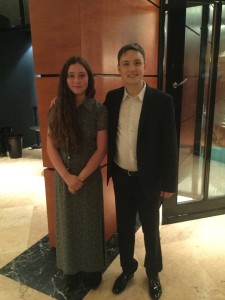By Amalia von Studnitz
Special to the Herald
This last summer before starting 8th grade at Benicia Middle School, I took a trip to Germany with my parents. This trip was especially important to me because we were able to participate in a series of piano concerts throughout the country that celebrated my great uncle’s 100th birthday. My great uncle, Karlrobert Kreiten was a famous concert pianist in Germany in the 1930s and 1940’s. He was born in Bonn on June 26, 1916. His father, my great-grandfather Theo Kreiten, was a composer, author, poet, and music professor, and his mother Emmy, my great-grandmother, was a concert singer. He made his public debut at the age of 11 with Mozart’s “Piano Concerto in A Major” in a live radio broadcast.
At age 16, he won the Grand Mendelssohn Prize for piano in Berlin, as well as the Silver Medal of Honor at the International Music Competition in Vienna. He had a hugely successful career performing many concerts throughout Europe which led him to fame.
In 1943, my great-uncle was reported to the Gestapo by a neighbor for making negative remarks about Adolf Hitler and the Nazis. He was arrested in Heidelberg just before he was to have given a concert at the university there. He was condemned to death and four days later hanged in Plötzensee Prison in Berlin. My great-grandparents were even sent a bill by the Nazi government afterwards for them to pay for his hanging.
A Berlin memorial on the life and death of my great-uncle is featured in the “Topography of Terror” outdoor exhibit, which deals with the fear imposed upon by the Gestapo. Streets in Düsseldorf, Bonn, Hilden and Cologne have been named after him, and the current Piano Prize of the Music University of Cologne is named in his honor as well.
My father, Gilbert von Studnitz was asked to be the patron of the concerts honoring my great-uncle that were performed by Florian Heinisch, who played the same program that my great uncle was going to perform the night he was arrested. My family and I went to four of the 10 concerts that were held. I was surprised that I enjoyed it so much. Normally if a concert was 2 hours long, I would tend to get bored but the pianist kept everyone on the edge of their seats. It was amazing from beginning to end. The four I went to were in Bonn, Düsseldorf, Köln and Heidelberg. The last one was especially impressive because it occurred exactly on my great-uncle’s 100th birthday, and in the same grand hall he was to have performed the day he was arrested. We also visited family and friends in Germany and France on this trip, but the concerts were the highlight.
There is a CD coming out in January that presents the music of newly found phonograph records of my great-uncle performing that were made during the 1930s and 1940s and have been remastered.







An interesting story indeed, Amalia. Particularly noteworthy is that making negative remarks about leadership at the time was indeed verboten and punishable. Let’s hope history does not repeat itself.
Well done, Amalia!
Compliments to you and your family!